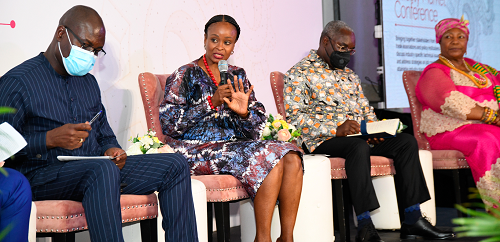
Informal sector must embrace precision quality to scale up - DTI
The Chief Executive Officer (CEO) of Accent and Arts Limited and Founder of the Design Technical Institute (DTI), Ms Constance Swaniker, has urged players in the informal sector, especially master crafts persons to formalise their operations, embrace precision quality and adhere to standards to help scale up their businesses.
She said local crafts persons and manufacturers, when well positioned and given the necessary training, could create jobs and produce quality products and reduce the country’s dependency of foreign goods imported into the country on a daily basis.
Advertisement
Ms Swaniker, who is also a master craftswoman with over two decades of experience, was speaking at the Precision Quality (PQ) Market Conference at the Trust Sports Emporium in Accra last Thursday.
Also present at the conference were the Director-General of the Ghana Standards Authority (GSA), Professor Alex Dodoo, the Director-General of the National Development Planning Commission (NDPC), Dr Kodjo Esseim Mensah-Abrampa and the President of the Greater Accra Market Association, Manye Mercy Afrowa Needjan.
Training
The conference brought together various trade associations and master crafts persons from Accra, Kumasi and Ho as part of the DTI’s strategy to improve the work skills and practices of some 5,000 master crafts persons and 1,000 SMEs in the country through the PQ curriculum training programme.
The PQ curriculum was developed by industry players and certified by the Commission for Technical and Vocational Education and Training (COTVET).
Ms Swaniker said the programme was expected to contribute to the transformation of the informal sector and support the government’s “Transforming youth TVET livelihoods for sustainable jobs” project to provide 40,000 direct and indirect work opportunities for the youth.
“I was trained by an informal sector master and you need to be able to connect with them at their level. These are people who have not gone through any formal education or training and you heard what most of them were saying, there is a knowledge gap and we need to connect with them and respect what they know at their level,” she said.
Transformation
She said the conference was organised to expose the crafts persons to policy makers and regulators to help inspire them and also give the government a window into the minds of players in the informal sector to inform policy making.
“That is why we organised a high-level conference to let them know what it takes to penetrate the formal sector. ????It is a mindset problem, if you refuse to formalise, if you refuse to understand that quality is not cheap and the importance of standards,”???? she said.
Ms Swaniker observed that the conference would inspire the master crafts persons to embrace the idea of formalising their businesses to meet global standards.
“I think today what we have been able to do is that we did not tell them what we think they should do but we are rather soliciting their views. If you want to make change or for change to happen, you need to lead the change and then you can sit on the table with the creatives and tell them what they need to scale up,” she said.
Assistance
For his part, Prof. Dodoo encouraged the informal sector players to feel free when approaching the GSA for any service because the authority was opened to facilitate the growth of businesses and ensure that both producers and consumers were protected.
He said the government would continue to support informal sector workers, especially master craft persons to ensure that they embrace quality and standards to aid in the development of the country.
“The government is determined to formalise the informal sector immediately to unlock more opportunities for their development,” he said.



